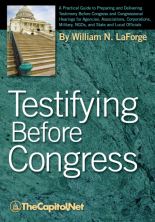From the Congressional Glossary – Including Legislative and Budget Terms
Political Action Committee / PAC / Leadership PAC
PAC-MAN (REMI GAILLARD)
Political Action Committee (PAC): A private group organized to elect or defeat government officials or to promote or defeat legislation. PACs are defined and regulated by state and federal law.
A leadership PAC is a political action committee established by a congressional member to support other candidates. A political committee that is directly or indirectly established, financed, maintained or controlled by a candidate for Federal office or an individual holding federal office but which is not an authorized committee of the candidate or individual and which is not affiliated with an authorized committee of the candidate or individual, except that leadership PAC does not include a political committee of a political party.
A candidate for a House or Senate seat may also establish her own PAC, popularly called a leadership PAC, which is a political committee directly or indirectly established and controlled by the candidate. Strictly, it is a nonconnected PAC, that is, not a PAC affiliated with a corporation, labor union, or membership organization such as a trade association or professional society. It is not the principal campaign committee or an affiliated committee of the candidate and does not influence an election on the candidate’s behalf.
A leadership PAC is subject to the same receipt limit of $5,000 applicable to other PACs. It may receive contributions from individuals, party committees, other PACs, other political committees, and from candidate campaign committees. It may donate as a PAC, which limits contributions to $5,000 for each candidate for each election. A candidate’s leadership PAC may donate up to $5,000 for each election to the candidate’s own campaign committee.
PACS and Super PACs
Candidates’ campaign committees and leadership PACs may only receive hard money as contributions, that is, money that is fully covered by federal laws and regulations. The kinds of contributions just described are hard money. Campaign funding that is legal but only partially or immaterially regulated is called soft money. Candidate campaign committees and leadership PACs may not receive soft money contributions. Candidates for Congress are also limited in their participation in events for raising permitted soft-money contributions, such as for state or local parties. Leadership PACs must also report contributions, including contributions bundled by lobbyists, and their spending.
Congressional leaders, aspiring leaders, and many individual members also maintain political action committees (PACs), so-called leadership PACs, which they use to support their party’s candidates for Congress. This support can even extend to advertising not specifically related to a campaign, such as a testimonial for a member on a vote he has cast. Party leaders, such as each chamber’s majority and minority leaders and the House Speaker, may have political responsibilities broader even than their leadership PAC, including not only fund-raising for their party and its members but also messaging and communications, political operations, coordination with the incumbent president (or the presidential candidate) of their party, and coordination of their PACS and campaign organization.
Also see Super PAC / Independent Expenditure-Only Committee; § 2.10 Campaigns and Elections, § 2.70 Federal Campaign Finance Laws, in Congressional Deskbook; § 2.26 The Campaign Compliance Imperative, in Lobbying and Advocacy.
More
- List of Leadership PACs and Sponsors – FEC
- Metadata Description of Leadership PAC List – FEC
- What is a PAC? – opensecrets
- List of Leadership PACs – opensecrets
- “Campaign Financing,” CRS Report IB87020 (22-page PDF
 )
) - “Lobbying and Related Reform Proposals,” CRS Report RL33293 (28-page PDF
 )
) - “Lobbying Regulations on Non-Profit Organizations,” CRS Report 96-809 (19-page PDF
 )
) - “Political Action Committees: Their Evolution, Growth and Implications for the Political System,” CRS Report 84-78 Part 1 (154-page PDF
 ) Part 2 (140-page PDF
) Part 2 (140-page PDF )
) - “The Constitutionality of Campaign Finance Regulation: Buckley v. Valeo and Its Supreme Court Progeny,” CRS Report RL30669 (56-page PDF
 )
) - “Political Spending by Organized Labor: Background and Current Issues,” CRS Report 96-484 (8-page PDF
 )
)
Courses
- Congressional Operations Briefing – Capitol Hill Workshop
- Drafting Federal Legislation and Amendments
- Writing for Government and Business: Critical Thinking and Writing
- Custom, On-Site Training
- Preparing and Delivering Congressional Testimony and Oral Presentations, a Five-Course series on CD
- Congress, the Legislative Process, and the Fundamentals of Lawmaking Series, a Nine-Course series on CD
Publications

Testifying Before Congress

Pocket Constitution

Citizen’s Handbook to Influencing Elected Officials: A Guide for Citizen Lobbyists and Grassroots Advocates

Congressional Procedure
CongressionalGlossary.com, from TheCapitol.Net
For more than 40 years, TheCapitol.Net and its predecessor, Congressional Quarterly Executive Conferences, have been teaching professionals from government, military, business, and NGOs about the dynamics and operations of the legislative and executive branches and how to work with them.
Our custom on-site and online training, publications, and audio courses include congressional operations, legislative and budget process, communication and advocacy, media and public relations, testifying before Congress, research skills, legislative drafting, critical thinking and writing, and more.
TheCapitol.Net is on the GSA Schedule, MAS, for custom on-site and online training. GSA Contract GS02F0192X
TheCapitol.Net is now owned by the Sunwater Institute.
Teaching how Washington and Congress work ™

